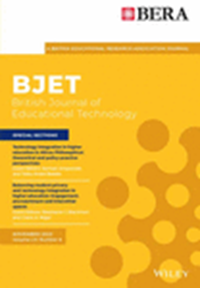The impact of high-immersion virtual reality and interactivity on vocabulary learning
Abstract
Virtual reality (VR) has been gaining prominence in education, with its interactive capabilities continually expanding. This quantitative study (N = 91) tested the educational effectiveness of high-immersion VR (HiVR) versus low-immersion VR (LiVR) and the impact of interactivity on vocabulary learning. The between-subjects portion of this study compared foreign language vocabulary learning using HiVR headsets and traditional laptops (LiVR). Multivariate analyses of covariance revealed that although the vocabulary scores of learners using HiVR were higher than the scores of learners using LiVR, the difference was not statistically significant. The within-subjects portion of this study tested the impact of the interaction with virtual objects representing the target vocabulary. Although students reported enjoying the interactive aspects of the experience, the interactivity did not significantly impact learning outcomes in either HiVR or LiVR. These findings have practical and theoretical implications about how different degrees of immersion and interactivity influence vocabulary learning and retention. The study is relevant for scholars and language teachers, as well as curriculum and VR application designers.
Practitioner notes
What is already known about this topic?
- High-immersion virtual reality (HiVR) offers contextualized vocabulary learning through interacting with objects.
- Vocabulary is essential for language learning.
- Research on interaction with virtual objects has received little attention.
What this paper adds?
- It investigates the impact of VR on vocabulary learning.
- It explores the effect of object interactivity on vocabulary learning.
- It shows that VR improves vocabulary learning and retention regardless of object interaction.
Implications for practice and/or policy
- Our main implication is that VR can be beneficial for vocabulary retention.
- Students using HiVR and low-immersion VR (LiVR) make comparable learning gains.
- Practitioners should create VR activities that capitalize on the immersive features of the technology while keeping cognitive demands manageable.


 求助内容:
求助内容: 应助结果提醒方式:
应助结果提醒方式:


